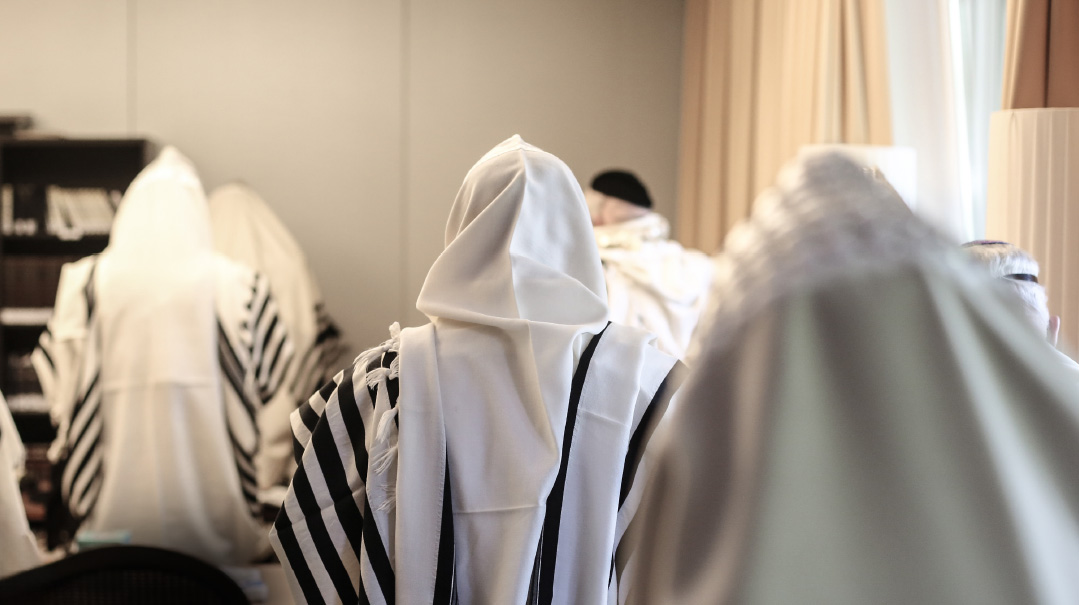Shalom
| October 8, 2024It’s my favorite Tishrei tradition, and I secretly look forward to it as Yom Kippur gets closer

I
sat in my seat, watching women and girls silently file out of the shul. Kol Nidrei was over, and we had officially ushered in Yom Kippur. The sounds of men downstairs, reciting Tehillim, learning, or saying Shir Hayichud, wafted up through the mechitzah in a steady background noise.
For the last few years, I’ve stayed in shul on Kol Nidrei night after the ezras nashim empties out. I’m drawn in by the cavernous, quiet space and the rows of empty benches. I move to the first row of seats by the mechitzah, and between chapters of Tehillim, peer through the slats at the sea of white talleisim below. There’s something grounding and calming and safe about letting the sounds wash over me, and I find it easier to connect to the day when I have the shul to myself. It’s my favorite Tishrei tradition, and I secretly look forward to it as Yom Kippur gets closer.
This year was different. It had been a strange few years: a short marriage, a quick divorce, and the cliché “finding myself post-divorce” phase. Looking back, it was hard to say when exactly it happened — but somewhere along the way, I lost my relationship with Hashem.
Don’t get me wrong, I did all the things. I constantly spoke to Him out loud, I was a frequent visitor at my rebbe’s kever, I made time to daven from a siddur, I listened to shiurim. But “Baruch Hashem” and “Thank You, Hashem” had become empty clichés, like a, “Hey, how are you?” thrown out to a passing acquaintance as they walked on.
I’d reassure myself that it was going to be okay because Yom Kippur was coming. I was hoping the intensity of the day would snap me out of this funk. I loved the davening in our large shul — loved to close my eyes and let the thunderous singing of thousands of men envelop me. But mostly, I was looking forward to my Yom Kippur tradition, to have the shul all to myself and let Hashem into my very cynical heart.
And then Yom Kippur arrived, and once again, I stayed in my seat. I waited for the last few stragglers to leave, and then gathered my things to move up to the mechitzah. I closed my eyes for a few seconds, drinking in the murmur of thousands of men below and the stillness around me. The time passed slowly. I said Tehillim and glanced up at the towering aron kodesh, trying to make myself feel something for goodness’ sake.
An hour passed, and then another, and I finally gave up. My magical cure wasn’t doing the trick. The hush of holiness wasn’t having the same effect it usually did.
It was misty and foggy when I walked home, like the entire world was sighing along with me.
I was back in my seat in the shul the next day, feeling the press of women and girls all around me. I safely disappeared into my own machzor, swallowed up by the choked whispers, muted shuffling, quiet sniffles from behind machzorim, and swaying crowd. I pressed my face into the pages, trying to force myself to take it in, to feel something, but the atmosphere did nothing to help. I stayed through Mussaf and then walked home, intending to spend the rest of the day on the couch. The frustration coursed through my veins. If even Yom Kippur wasn’t enough to shake off the numbness, what would?
The afternoon flew by. Before I knew it, it was time for Minchah and Ne’ilah. My family decided to go to our neighborhood shtibel, where my father would be the only Kohein saying Bircas Kohanim, and I grudgingly decided to join.
Being a bas Kohein and hearing my father duchan never gets old. I can still clearly remember going to shul with my mother when I was young, smoothing down my brand-new dress and waiting impatiently to hear my father’s voice. I’d often feel the urge to turn around and let the other women know that it was my father standing up there, and practically burst from pride when he’d start chanting the brachah. I’d look through the mechitzah the second it was over to watch him lower his tallis and excitedly listen out for the, “Shkoyach, Kohein!” that would follow.
Minchah started, the thought, It’s almost over, it’s almost over, let yourself feel something, come on, frantically tumbling around my mind. Finally, finally, we got to Bircas Kohanim.
I closed my eyes, and my father’s strong baritone rang throughout the small shul.
“Yivarechecha….”
I felt that familiar surge of pride in my chest. That was my father. I could picture him with his hands raised under his tallis; a portal of brachah for everyone in the shul.
“V’yishmerecha….”
My mind suddenly flashed back to the day before, when the same deep voice had softly whispered birchas habanim by my ears, warm hands on my bowed head.
“Ya’er Hashem panav eilecha….”
He’s right here. Hashem. I could almost reach out and feel Him brush past my fingertips, a whisper of a presence, bentshing me together with my father.
“Veyaseim lecha….”
I squeezed my eyes tighter, tears suddenly prickling behind my eyelids as my chest constricted.
hands on my head—
Hashem, please—
my father’s voice, whispering; echoing — He’s right here, He’s right here—
“Shalom.”
I exhaled, my heart at ease.
(Originally featured in Family First, Issue 914)
Oops! We could not locate your form.







